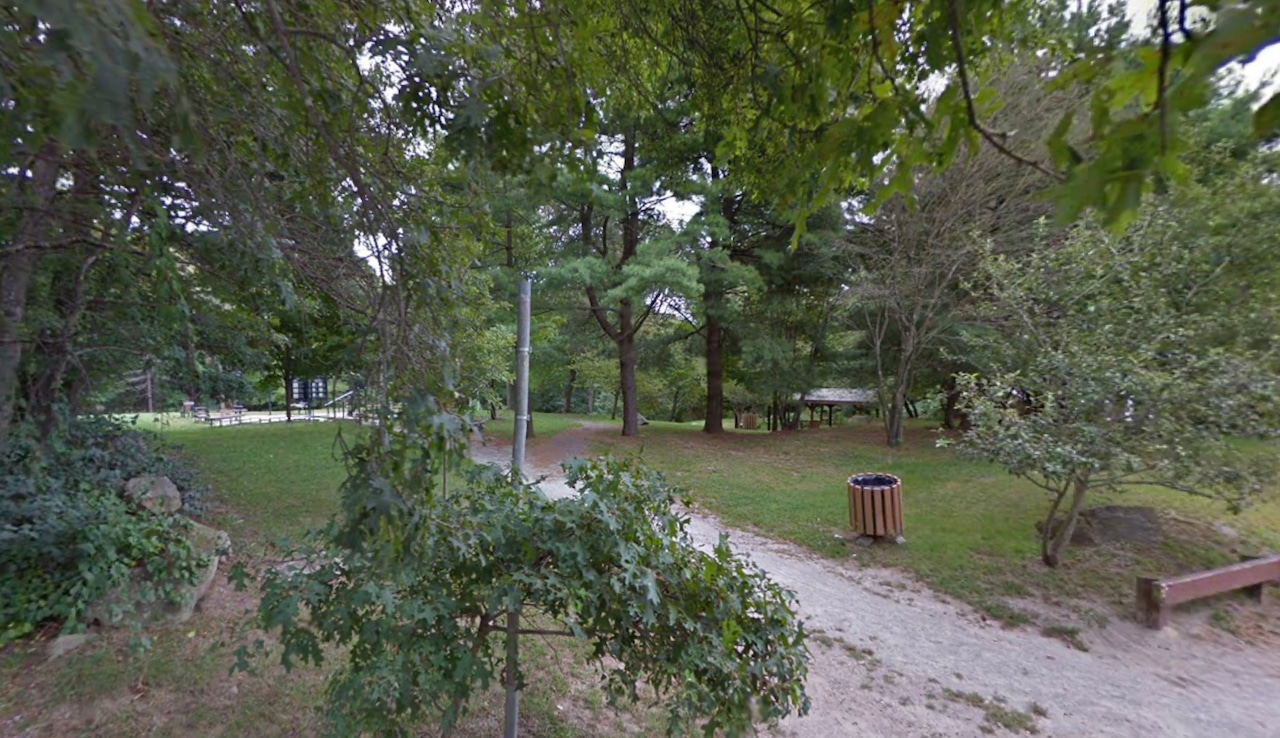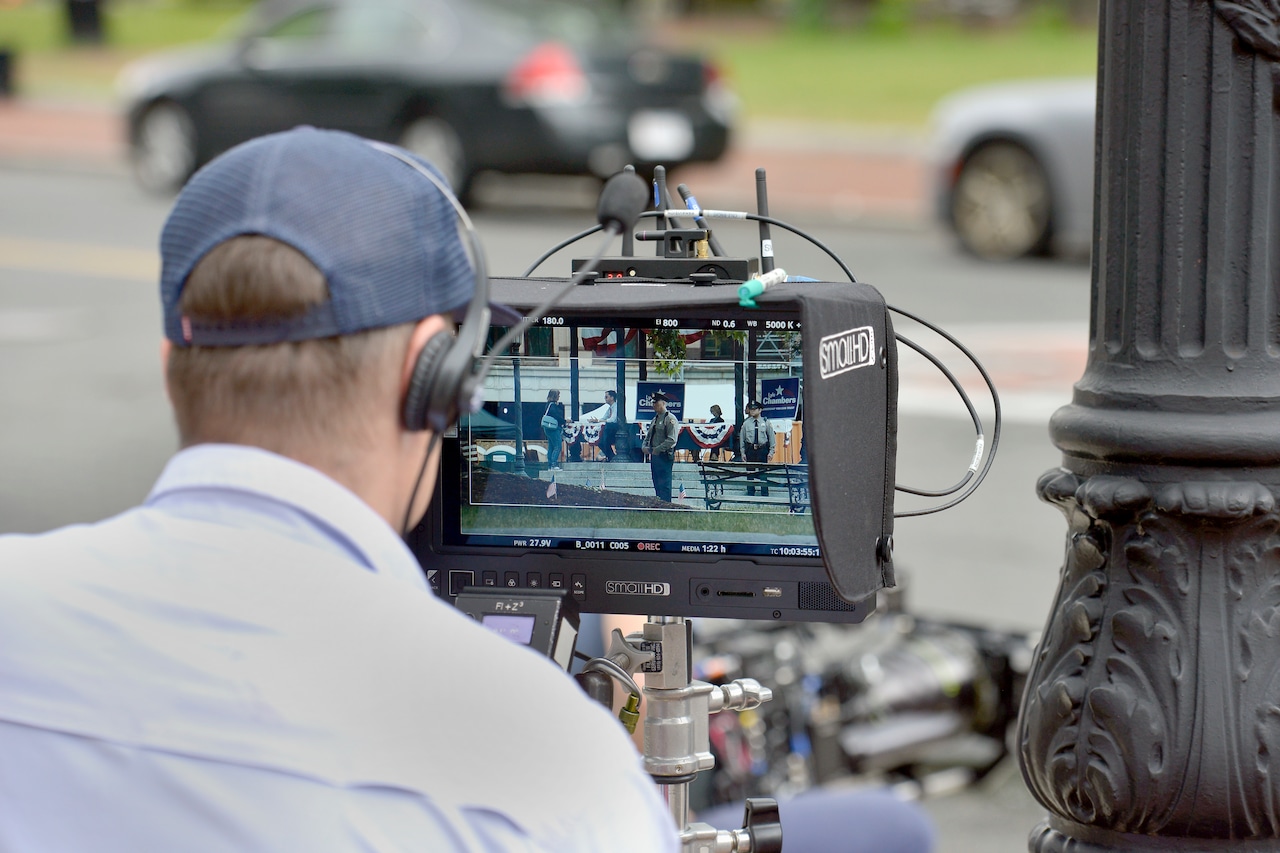BOSTON — Two days before Christmas in 2016, Dr. James Baker celebrated the holiday with his 23-year-old son, Max.
That day, Baker, a physician, and Max, who was in recovery from heroin addiction, spoke about the need to increase treatment. Max then went to his mom’s house, but Baker didn’t realize she was out of town.
“On the 28th, he was found dead, alone in the bathroom upstairs,” Baker said, speaking to legislators at a recent public hearing in Boston.
Max had gotten into recovery, but a month before he died, he was injured in a serious car crash and turned to medication for his pain, leading to his relapse, his obituary says.
Baker, president of the Massachusetts Society of Addiction Medicine, wonders what would have happened if his youngest son had the option to go to a supervised injection site, a place where people can use illegal drugs while being monitored in case of overdose.
“If he knew he was going to relapse when he pawned my camera on the morning of the 27th, would he have gone to one and stayed alive?” Baker asked.
Baker was one of several parents who spoke about losing their child to an overdose and urged the legislature to authorize supervised injection sites. A bill before the legislature would create a pilot program for overdose prevention sites.
Advocates say these places are life-saving and a key tool to fight the worsening opioid overdose epidemic. “These are all preventable deaths. Every single one of these,” said Gabriel Quaglia, who is in recovery and started a harm reduction advocacy group, the Folding Chair Project, in Holyoke.
But not everyone is on board. The federal government challenged the opening of a proposed site in Pennsylvania. Two supervised drug consumption sites in New York City — the only two in the country — have faced threats but are operating two years after opening.
State Sen. John Velis, D-Westfield, only recently accepted their value.
“Five years ago I would have laughed at you,” said Velis, Senate chair of the Joint Committee on Mental Health, Substance Use and Recovery, which held an October hearing on the bill. “That’s not the case anymore.” He visited a site in Harlem, and is making plans to see another soon in Canada.
Bill’s intent
The proposed state legislation would create a 10-year pilot program for what it calls overdose prevention centers. People could use pre-obtained drugs while professionals monitor them in case of an overdose. Facilities would be required to provide clean injection supplies, naloxone (the overdose reversal medication) and have access to treatment services.
The state Department of Public Health would license sites and submit regular reports on them. Local boards of health would need to opt into the pilot program before an organization applies to the state for a license. That’s a key point, Velis said. “In short, if a community does not want it, they will not have to have it,” he said.
Sen. Adam Gomez, D-Springfield, is one of 15 senators who signed on to the bill. “I’ve lost family members to the opioid crisis,” he told The Republican and MassLive. “These are centers that could be a way to help people wean off and save the individual’s life.”
The idea of the state authorizing supervised consumption sites is not new. Lawmakers considered similar bills in their 2019-2020 session and their 2021-2022 session.
Before that, a 2018 law created a state Harm Reduction Commission. One of its tasks was to advise on how to address the opioid crisis, including the possibility of supervised injection sites.
Among other findings, the group’s 2019 report recommended the state test a program of at least one supervised consumption site with approval from the municipality where it was located. It also noted the federal government’s stance against the sites and said the state would need to investigate legal protections for the organizations and employees running a site.
Since then, the opioid epidemic has worsened, despite work to expand naloxone access and medication for opioid use disorder, Dr. Peter Friedmann told legislators. He is chief research officer at Baystate Health and editor in chief of the Journal of Substance Use & Addiction Treatment.
Last year, 2,357 people died of opioid overdose deaths in Massachusetts, the most on record, according to state data. Hampden County saw an unprecedented number of deaths, 227, last year.
The vast majority of the accidental deaths from overdoses that Northwestern District Attorney David Sullivan sees are people who were alone, without someone to call 911 or give them naloxone. They were found in rooms, tents, alleys, and second-floor bedrooms of their families’ homes, he told lawmakers.
Friedmann thinks the sites should be available. “Over the years I’ve had many patients who were unstable, or using,” he told The Republican and MassLive, “and it would have been great if I had a place where I could send them say, ‘You know what, I understand you’re still struggling. If you’re going to use, why don’t we do it in a way that will keep you alive?’”
The state legalized cannabis for recreational use despite federal laws against it, he pointed out.
“That’s not even something that’s life-saving,” he said. “We’re in the midst of an unremitting epidemic of opioid overdose deaths. This is a more compelling reason … to assert states’ rights.”
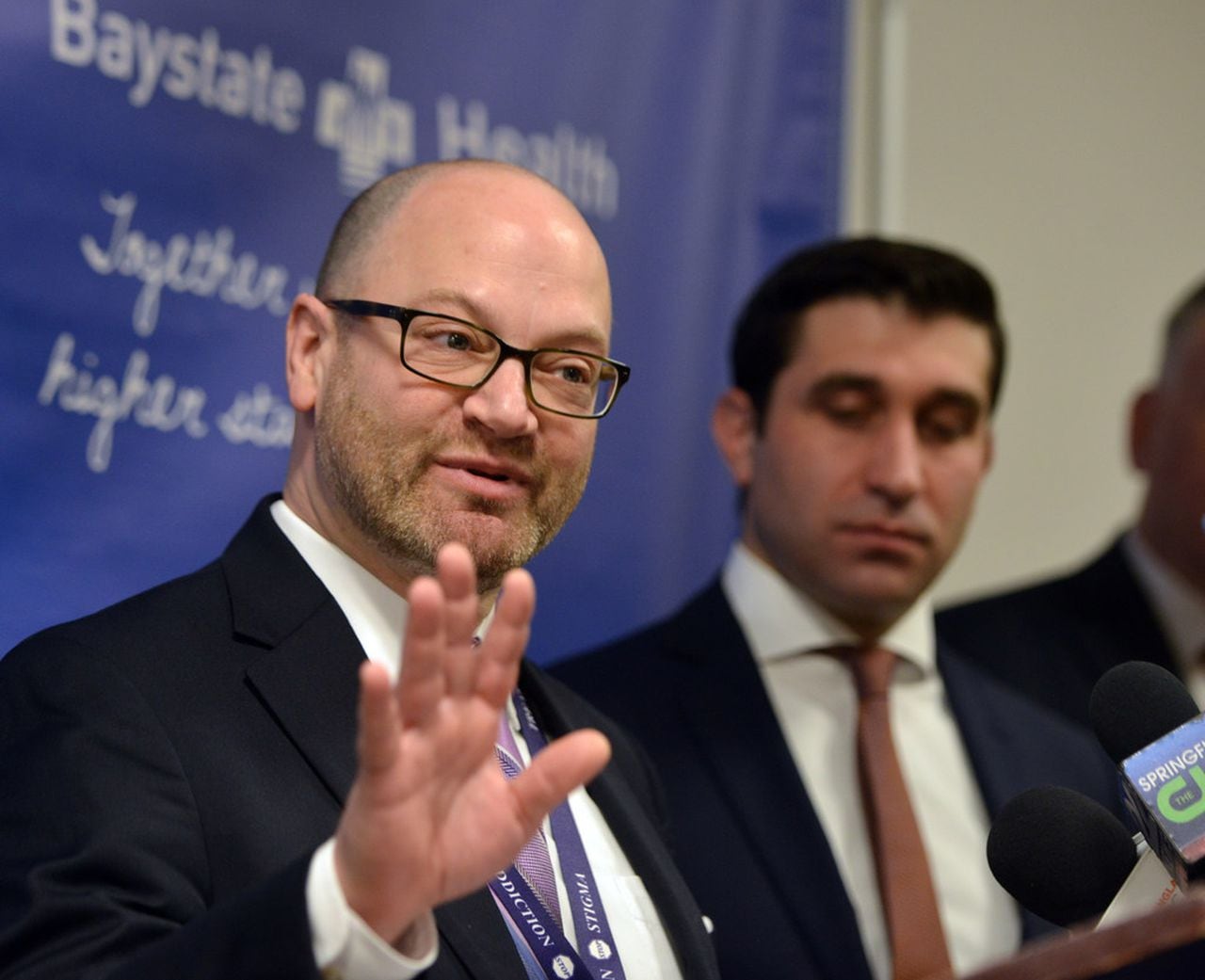
Dr. Peter Friedmann, Baystate Health’s chief research officer, is among the participants in the Sept. 6 morning forum, “Addressing the Opioid Crisis in Small and Rural Communities in Western Massachusetts,” at the University of Massachusetts in Amherst. (Don Treeger file photo/The Republican)
He added, “It’s not going to solve the entire problem. But you know, it’s something that is known to work.”
The Massachusetts Medical Society endorsed pilot sites in 2019, and a recent poll indicated public support, Friedmann said. A survey of state voters in September found 70% of 600 respondents supported legislation to allow cities and towns to open overdose prevention sites. Beacon Research conducted the poll and the American Civil Liberties Union of Massachusetts sponsored it.
‘Not a panacea’
Officials agree that action needs to be taken on the opioid overdose epidemic, but not everyone sees supervised injection sites as part of the answer.
While Sullivan, the Northwestern district attorney, supports the legislation, Hampden District Attorney Anthony D. Gulluni does not.
His office has worked on programs, like the Hampden County Addiction Task Force, that treat substance use disorder as a disease, he said in a statement to The Republican and MassLive. But the overdose prevention site legislation is “tantamount to the state’s sanctioning and facilitation of illicit opiate use, such as fentanyl, which continues to kill thousands of people in the Commonwealth every year,” Gulluni wrote.
State Sen. Nick Collins, D-Boston, wants to see more people with substance use disorder civilly committed into treatment through state law Section 35. It allows police, court officials, doctors and someone’s relatives to file a petition for involuntary commitment if they believe a person is likely to cause serious harm through their substance use.
“Creating new laws that don’t get to the roots of the problem at the end of the day, it’s perpetuated hospice,” Collins said at the October hearing. “We have the ability to intervene and I hope we do that first before we go down this path.”
If sites opened tomorrow, it wouldn’t end the crisis, said state Sen. Julian Cyr, D-Cape and Islands, the legislator who filed the Senate bill this session. “This tool is not a panacea,” he told legislators, but he thinks it will help.
The Joint Committee on Mental Health, Substance Use and Recovery will vote on its recommendation for the bills, likely in January, Velis said.
Legal questions
As of now, two sanctioned sites operate in the U.S., both in New York City. The state of New York never authorized the sites through legislation, but city leaders and its health department have supported them.
Damian Williams, the U.S. attorney for the Southern District of New York, has said they are operating in violation of state and federal law, specifically a statute that prohibits spaces from being maintained as a place to use controlled substances.
“That is unacceptable,” he told The New York Times in August. “My office is prepared to exercise all options — including enforcement — if this situation does not change in short order.”
In 2018, then-U.S. Attorney for Massachusetts Andrew Lelling said Massachusetts sites would violate federal law. Rachael Rollins, who served as U.S. Attorney after Lelling, expressed support for the sites while she was Suffolk County district attorney.
Rhode Island legalized a pilot program for the sites, and an organization is planning to open a site in 2024.
Philadelphia nonprofit SafeHouse has wanted to open a site for years, but a legal battle followed. After the U.S. Attorney’s office of the Eastern District of Pennsylvania sued, a judge ruled in the nonprofit’s favor. Then in early 2021, an appellate court ruled that a supervised injection site would not be legal, and the Supreme Court said it wouldn’t review the case. The nonprofit seeking to open the site has filed a civil lawsuit and is still trying to open.
Amid that ongoing legal battle, Massachusetts legislators have expressed frustration about a lack of clarity from the federal government.
A necessary tool
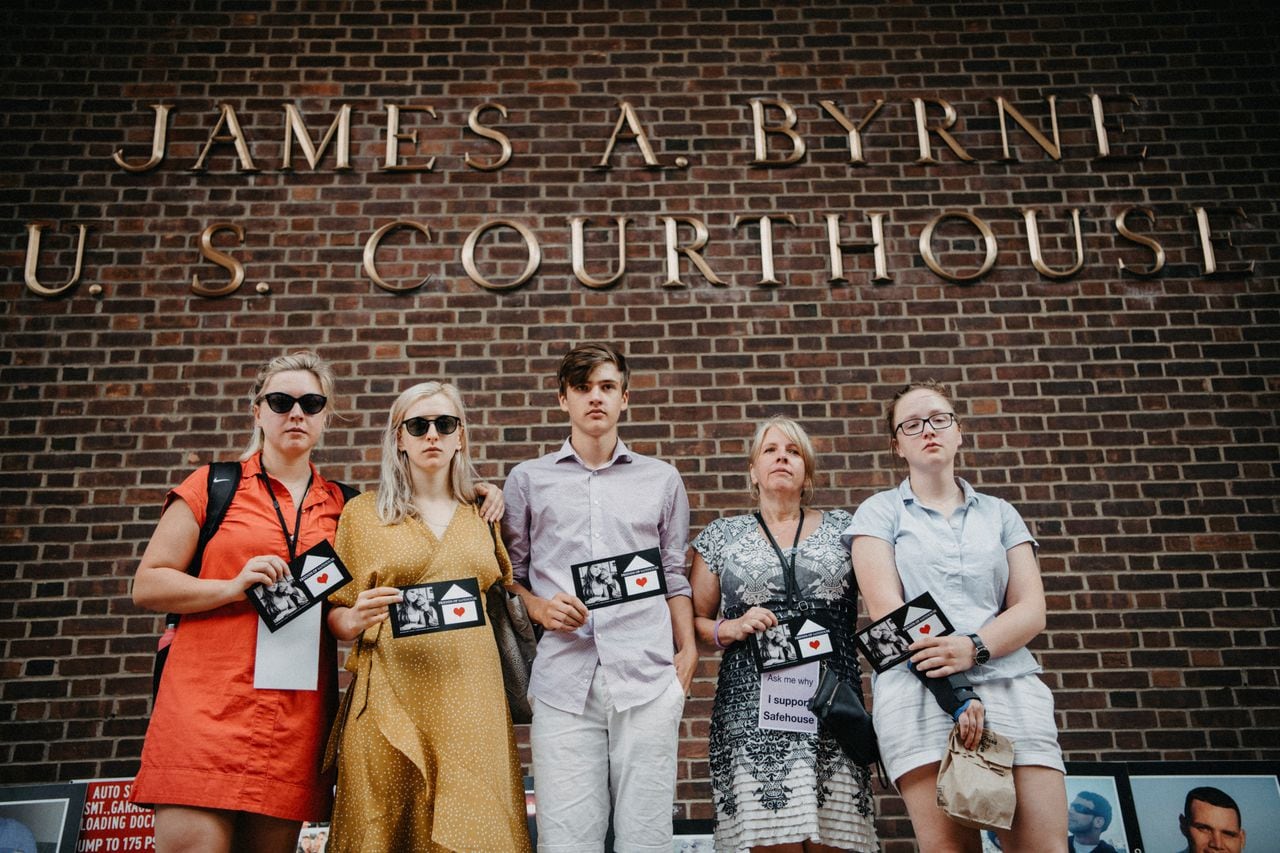
Cara Moser, who lost her daughter five years ago to an opioid overdose, attends a rally supporting a supervised consumption site in Philadelphia with her family in 2019. (Photo courtesy of Holden Blanco/HKB Photo)Courtesy of Cara Moser
Five years ago, Eliza Harper died of an opioid overdose on her 26th birthday in South Deerfield. She was 10 months into her recovery and found alone, said her mother, Cara Moser.
“One of the first things I remember saying, when I got home, was why don’t we have safe consumption sites?” Moser remembers asking her daughter how she would go about using drugs, if she relapsed.
“I’m not going to this time,” she said her daughter told her.
“There’s no reason why this beautiful human couldn’t be here today if we only cared enough about people who are drug users,” she said.
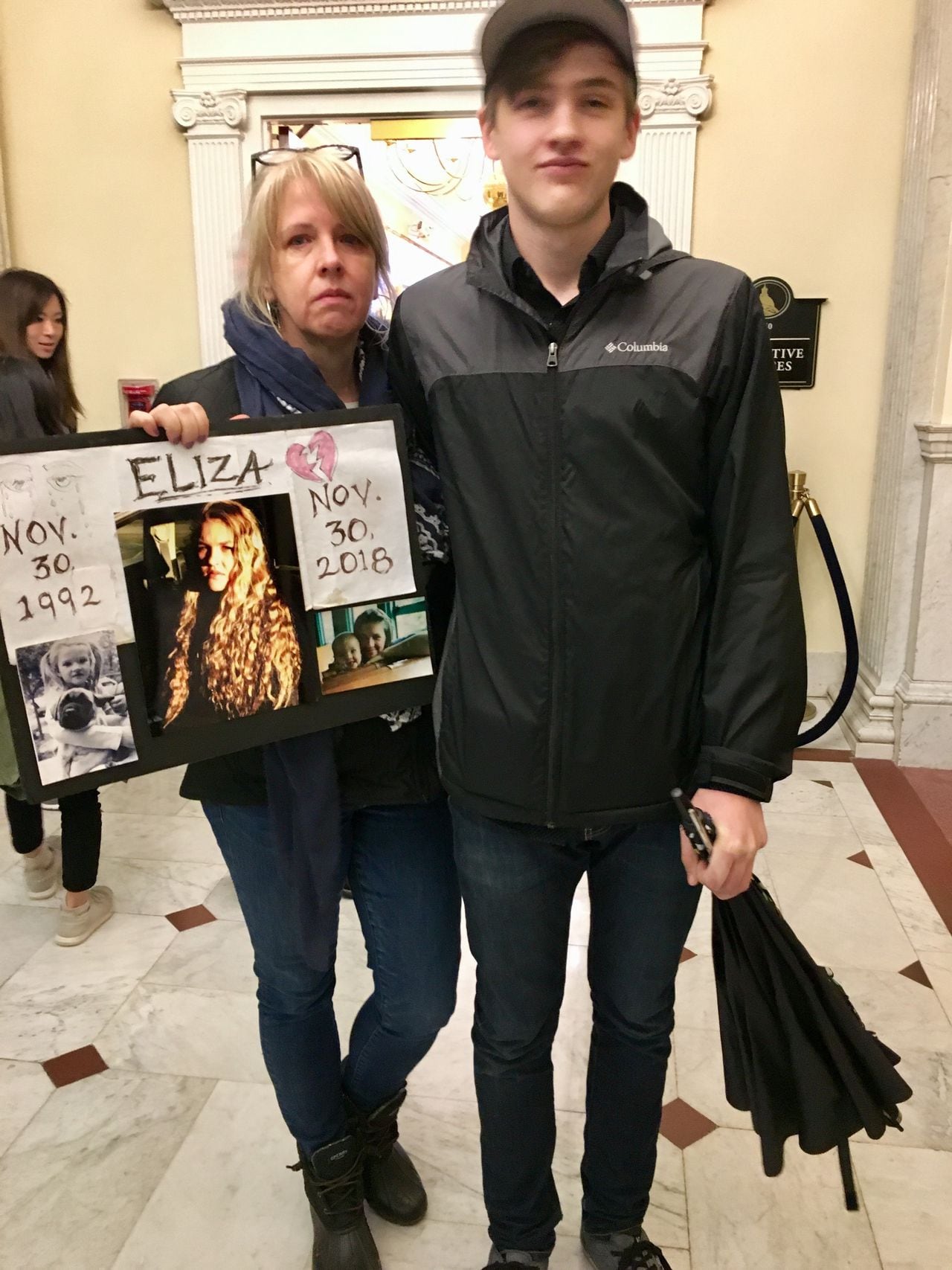
Cara Moser and her son, Jackson Harper, at the Massachusetts Statehouse in 2019. (Photo courtesy of Jeff Shotland)Jeff Shotland
Moser got involved supporting SafeHouse in Philadelphia, rallying outside a courthouse during legal hearings. She has also testified at the Massachusetts Statehouse.
“I get really mad when I start thinking about it — how we can just let people die?” she asked.
Liz Whynott is not sure she would be alive today if she had been born a decade or two later.
That’s because when she was younger, she struggled with heroin. Today, the drug supply has become much more toxic with the rise of fentanyl, a synthetic opioid that can be 50 times stronger than heroin, according to the Centers for Disease Control and Prevention. For the more than 2,000 deaths in Massachusetts last year where a toxicology screening was available, fentanyl was present in 93% of cases, according to the DPH.
“We’re losing so many people today and that has to stop,” she said.
Whynott is director of harm reduction services at Tapestry Health, a Springfield nonprofit where she has worked since 2008. The group operates all over Western Massachusetts by distributing Narcan, providing education and offering syringe services, for instance.
The debate over overdose prevention sites reminds Whynott of past discussions about naloxone, which just became available over the counter this year, and about opening needle exchange programs.
“People had the same kind of fear and misperception about naloxone. Fear that it would cause people to use, fear it would cause risky behavior,” she said. “Naloxone has again proven to be an incredible lifesaving (and) necessary tool.”
Tapestry is one of more than 30 groups in the Massachusetts for Overdose Prevention Centers coalition, a group supporting the legislation.
If the legislation passed, Whynott thinks that Tapestry would move to open a site. “It’s just another step that would help keep people alive.”
Early this year, Velis toured OnPoint’s East Harlem site, where he went into the overdose prevention room and saw staff giving someone oxygen. “It was just a mind-blowing thing to observe,” he said. The two sites report reversing more than 1,200 overdoses in two years.
His office has not gotten any testimony or outreach from groups opposing the legislation. Cyr’s office said it had also not received opposition.
Before saying how he’ll vote on the bill’s recommendation in the new year, Velis said he plans to visit Canada, where there are more than 40 supervised consumption sites.
Velis said he’s identified the most compelling argument in favor of these sites: “You can’t treat someone who is dead.”
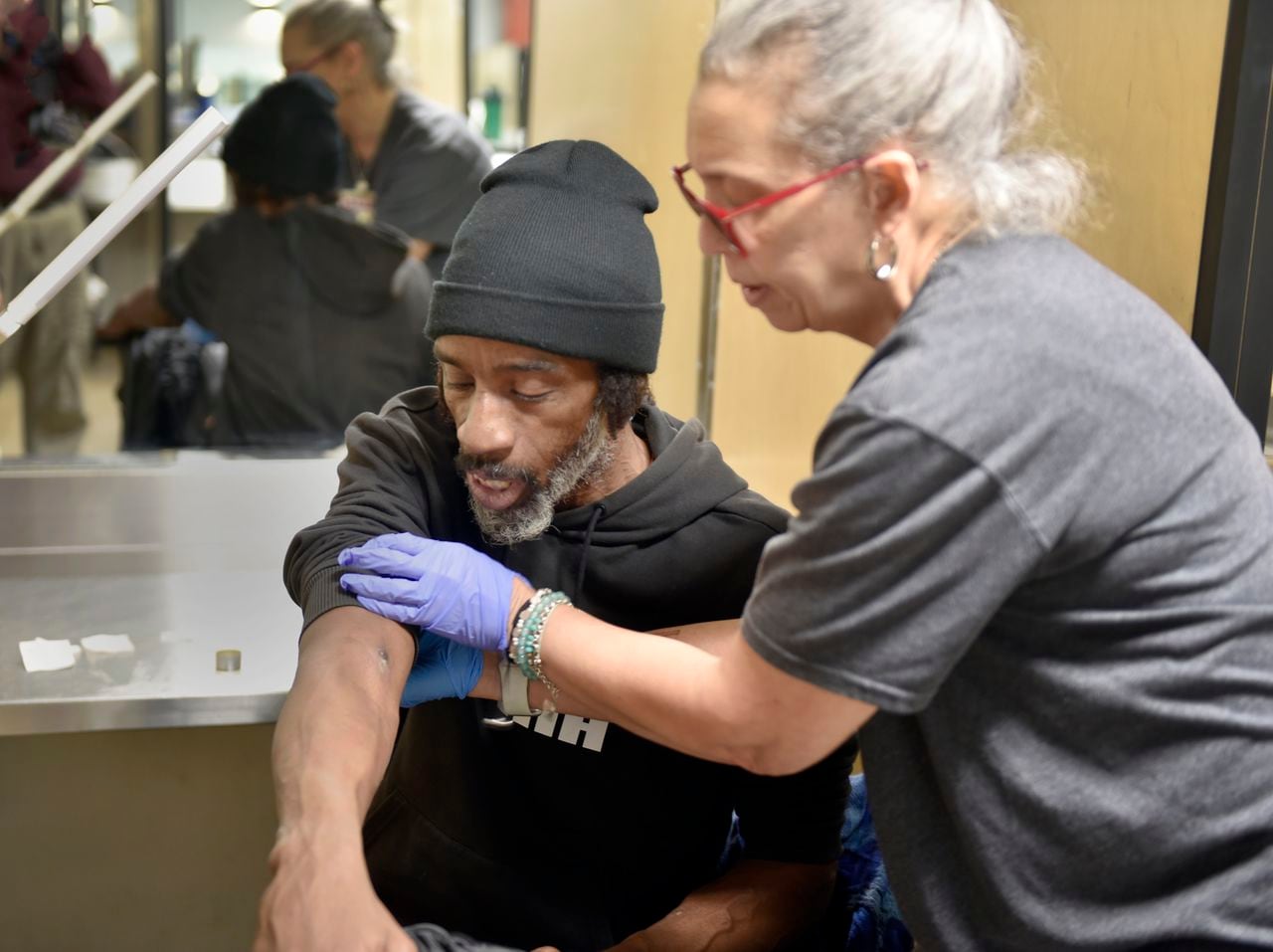
Antoine Balimr has a sore on his arm looked at by Alsane Mezon, the Responsible Person in Charge at the Overdose Prevention Center at OnPoint NYC’s safe injection site on 126th Street in New York City. He believes the sores are from the veterinary medicine Xylazine, commonly used to cut street heroin. Balimr is seen moments after injecting drugs under supervision. (Don Treeger / The Republican) 11/16/2023The Republican




